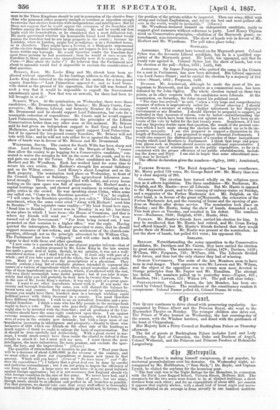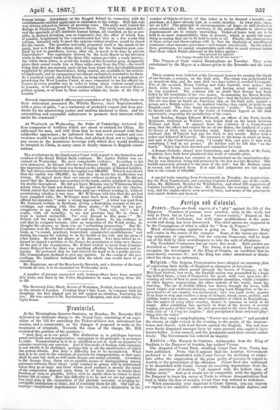31Ittrufnlis.
The Lord Mayor is making himself conspicuous, if not popular, by nocturnal perambulations over his domains. On Wednesday night, accompanied by Mr. Hallibiuton, (" Sam Slick,") Dr. Hoyle, and Captain Lynch, he visited the asylums for the houseless poor.
"The first visit was to the Night Refuge for the Homeless, in connexion with the Field Lane Ragged School, Victoria Street, Holborn Hill. The receptacle for the two sexes were found to be at distinct buildings, a short distance from each other; and for an expenditure of about 4001. per annum it appears that nightly shelter, with a small loaf of bread night and morning, are afforded on an average to from seventy to one hundred destitute human beings. Attendance at the Ragged School in connexion with the establishment entitled applicants to admission to the refuge. Still this rule was always relaxed in favour of. pressing cases. The party next visited the Refuge in Playhouse Yard, Whdecross Street. The wards were almost full; and the spectacle of 571 destitute human 'beings, all classified, as far as possible, in distinct divisions, was an impressive one, the effect of which was, if possible, heightened by the communicated fact that in a few weeks this asylum, intended only to most the extreme winter weather, would be closed for the season. The question naturally presented itself to the minds of the party, how is it that the solemn duty of caring for the houseless poor, confided by law to guardians, leaves, after all, so much to be done by private benevolence? The expenenee derived by the Lord Mayor in his previous visits to the casual wards of the three City unions provides a ready answer; for, while these latter, to avoid the burden of the houseless poor, designedly place their casual wards two or three miles away from the City—the result being that they are scarcely used—it has been found that the establishments supported by private benevolence, being central, are available to the wretched applicants, and in consequence are almost exclusively resorted to by them. As a practical result, the Lord Mayor, on being solicited by a gentleman representing the West London Union, at once consented to use his official influence in every possible way in order to bring about central casual wards in London, to be supported by a contributory rate from the several Metropolitan unions, or at least by those unions within the limits of the City of London."
Several superannuated officers and constables of the City Police have on their retirement presented Mr. Whittle Harvey, their Superintendent, with a piece of plate, "as a testimony of profound respect and deep gratitude for his unswerving justice and uniform kindness to them, and his unremitting and successful endeavours to promote their interests while under his command."
At Woolwich on Wednesday, the Duke of Cambridge reviewed the four companies of Artillery which are about to embark for China. He addressed the men, and told them that he was much pleased with their soldierlike appearance ; he informed them that every comfort and convenience would be provided for them, and advised them not to indulge to any excess in the pernicious beverage with which they would doubtless be tempted in China, in many cases so fatally ruinous to English constitutions.
The revelations in the Bankruptcy Court with regard to the formation and conduct of the Royal British Bank continue. Mr. Apsley Pellatt was examined on Wednesday. He gave remarkable evidence. According to his own statement, he became director in February 1849. He joined it under the impression that the bank was formed on the principle of limited liability. He had always considered that the capital was 100,000/. When it was shown that the capital was 500,0001., he said that no doubt his recollection was wrong. He signed more than one minute without reading it. He did not know that Mr. Menzies was secretary to the bank, and he persisted in stating his doubts throughout. He did not know Menzies was in Whitecross Street prison when the bank was formed. He signed the petition for the charter, which stated that the shares had been paid up—without reading it, without ascertaining whether it was true. Mr. ll'Gregor told him that the act had been complied with; Mr. M'Gregor must have been wrong ; Mr. Pellatt affixed his signature "wider a wrong impression." A letter was read from Mr. Cameron written in Scotland, giving a flourishing account of his proceedings, and ending with this pious strain—" It would be too presumptuous to say with the warrior of old, Veni, vidi, viei !' ; but I ought, with all humility, to say and proclaim that He in whom I trust is indeed invincible. For ever blessed be His name ! " Mr. Pellatt left the bank in 1850, and sold his shares. In his evidence he said that he resigned because, after an inspection of the Welsh works, he thought the advance on them was an " unbanldng transaction." But Mr. Linklater read Mr. Pellatt's letter of resignation, full of compliments to the bank, as "a sound, practical, benevolent, commercial establishment," and stating his reason for retiring to be the health of his wife and the press of other duties. He sold his shares at 31. discount. Two days before he resigned he signed a petition to the Crown for permission to issue new shares. At the end of his examination, Mr. Pellatt wished to know front Commissioner Holroyd how far there was anything affecting his character and integrity. He protested that he had entered the bank to do a public service. The Commissioner declined to give any opinion. In the course of the proceedings, Mr. LinkLater intimated that the whole case would have to go elsewhere.
Mr. Stapleton, one of the Members for Berwick, and a director of the bank towards its end, is to be examined on Wednesday next.
A number of persons connected with betting-offices have been arrested this week, and lined by the Police Magistrates in sums varying from 10/. to 30/.
The Reverend John Black, Rector of Walsoken, Norfolk, has met his death in the streets of London. Crossing Gray's Inn Lane, in company with his daughter, his foot slipped and he fell against an omnibus, fracturing his jaw. He was carried to St. Bartholomew's Hospital, and died within fortyeight hours.



































 Previous page
Previous page